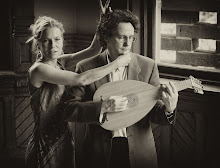Here is another piece from A Musicall Banquet of 1610. As I say in the last post, the book has a couple of solo 'madrigals' as he termed them by Giulio Caccini. Caccini worked for the Grand Duke of Tuscany, Ferdinand I de' Medici.
Though his publication of 1602, Le Nuove Musiche, is taken as a watershed between Renaissance and Baroque music, the ideas that shaped its contents were very much of the Renaissance. Caccini, with his colleagues at the Florentine court, Jacopo Peri, Vincenzo Galilei and others, were creating the 'new music' in imitation of the Ancient Greeks, who they knew declaimed poetry in the rhythm and pitches in imitation of spoken text; sort of a heightened poetry reading. Since they Greeks used the lyre and kithara to accompany themselves, they developed the new instrument the 'chitarrone' (big kithara?) which Caccini specifies as the best accompaniment for the voice in his long preface to Nuove Musiche. (The name chitarrone dropped away after a few of decades and theorbo became the most widely used term for the instrument.) Other instruments could be and were used though, because Caccini has the music printed with the singing line, and a bass line, with figures from which the lute player, or the chitarrone player would make up chordal accompaniment.
Robert Dowland (or Diana Poulton thinks it may have been his dad) makes up the accompaniment for the purchaser of Musicall Banquet; I guess the skill of figured bass playing wasn't widespread in England yet. His accompaniment, which I am using in this mp3 recording (which you can download for free here), is in lute tablature which tells you exactly what notes to play and where to put your fingers. It's busier than you would make up from a bass line, especially if you were playing the cumbersome and loud and sustaining chitarrone/theorbo. Caccini might have criticised it for getting in the way of his freedom to declaim the text, because for him, it's all about the singer and the text and, indeed there are a few other manuscript sources of tablature accompaniments from Italy that are less busy.
Here's a translation. You can hear that Caccini has carefully considered how an over-emotional man might berate his lover and represented it in pitch and rhythm. The words are by Giovanni Battista Guarini.
Amarilli, my love,
Don’t you believe you are my love, heart's desire.
Believe it and if doubt assails you,
Take my arrow open my breast,
and you will find written on my heart:
Amarilli is my love.


No comments:
Post a Comment